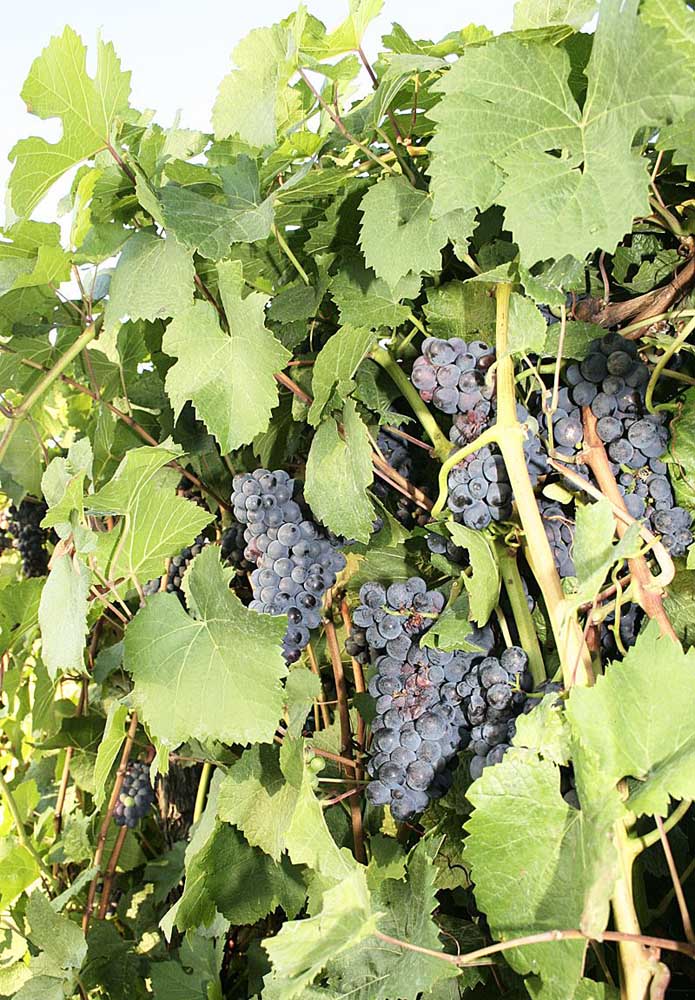Wine labeling controversy triggers class action lawsuit
Published 10:15 am Friday, July 10, 2020

- Wine grapes ripen in a vineyard in Oregon’s Willamette Valley.
A Napa Valley winery is accused of misleading consumers about the origins of its Oregon-labeled wines in a proposed class action lawsuit filed June 18.
Copper Cane LLC, based in Rutherford, California, purchases wine grapes from more than 40 Oregon vineyards to make pinot noir and rosé under the brand name Elouan. The company came under fire in 2018 after several Oregon winemakers and legislators argued the wines illegally referenced specific regional American Viticultural Areas, or AVAs.
Los Angeles County resident Barry N. Kay is now suing Copper Cane on behalf of wine drinkers who felt duped into believing Elouan comes from the Oregon viticultural areas, when actually it is made in California.
Attorneys for Kay did not return messages for comment.
The issue, while seemingly arcane, stems from both state and federal laws dictating what can and cannot be included on a wine label.
Characteristics such as geography, climate, soils and growing practices — collectively referred to as terroir — can all impact wine quality and flavor, making location a key selling point. The federal government designates American Viticultural Areas based on these unique features.
Labeling wine from particular viticultural areas can significantly increase its value. For example, a bottle of pinot noir labeled from Oregon sold for an average of $14.64 over a 52-week period ending on June 30, 2018, according to Nielsen cash register data. But pinot noir labeled from the Willamette Valley AVA sold for an average of $25.06 per bottle.
To include an AVA name on the label, a certain percentage of grapes in the wine must come from that area. Federal law requires at least 85%, while Oregon requires 95%. The wine must also be “fully finished,” that is fermented and bottled, in the same state where the AVA is located.
Though Copper Cane buys wine grapes from dozens of Oregon vintners, the fruit is trucked back to California to make Elouan wines. However, the labels, box art and online promotional materials for Elouan still contained references to the Willamette, Rogue and Umpqua valley AVAs, which according to Kay’s lawsuit amounts to false advertising.
“There is large consumer demand for wines from the Oregon AVAs, and consumers are willing to pay premium prices for these wines or purchase them instead of other wines because, rightly or wrongly, consumers believe that wines from the Oregon AVAs have superior flavors and other characteristics to wines produced in different regions elsewhere within and outside of Oregon,” the complaint reads.
“Reasonable consumers could have been, and in fact were, misled by the references to the Oregon AVAs on the product’s labels, packaging and marketing materials,” the suit alleges, leading Kay and others to pay more for wines they otherwise would not have purchased, and likening Oregon AVAs to Kona Coffee from Hawaii, or Kobe beef from Japan.
Jim Blumling, vice president of operations for Copper Cane, said the company is working on a response to the litigation.
Blumling said all labels for Elouan were previously approved by the U.S. Alcohol and Tobacco Tax and Trade Bureau. Nonetheless, Copper Cane voluntarily surrendered nine labels to the TTB in 2018 amid complaints from Oregon regulators.
Elouan labels, marketing and packaging have since been changed to avoid references to specific AVAs. Copper Cane was granted a “use-up” provision from the TTB to finish selling wines already bottled using the old labels, and Blumling acknowledged some of that product may still be in the hands of distributors.
“We were never functioning with any labels not approved by TTB,” Blumling said. “We were always in compliance with the federal government.”
Blumling added that the company worked closely with the Oregon Liquor Control Commission on the changes.
“We worked closely with the OLCC and made sure that their team had eyes on everything we executed,” he said.
At least one Oregon winery thinks the case could have ramifications within the industry. Willamette Valley Vineyards, of Turner, has been among the most outspoken critics of Copper Cane’s labels.
Bill Cross, director of government and community affairs for Willamette Valley Vineyards, said the winery is not involved in the class action lawsuit directly, but is pleased to see consumers taking an interest in the integrity of AVAs.
“The more the industry knows there is a higher awareness and interest of this information by consumers, the more they will promote that,” Cross said. “It could be a good step.”
The controversy further prompted the OLCC to recommend pulling Copper Cane’s license to do business in Oregon in late 2018. The company has appealed, and an agency spokesman said the case was referred to the state Office of Administrative Hearings.








